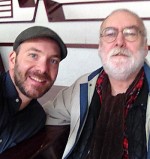Title
Subhead
The relationship between literature and social activism and art’s capacity to effect societal change were the topics of a talk given for Liberal Arts faculty member Anthony Lioi’s Contemporary American Literature class on March 31. The speakers were two influential figures in gay and lesbian literature. Poet Bryan Borland is the founder and editor of Sibling Rivalry Press, an independent publishing house based in Alexander, Ark., that champions gay writers. Joining him was activist, writer, and editor Ian Young, whose list of accomplishments includes founding what is widely regarded as the first-ever gay publishing house, Catalyst, in 1970.
Body
Their visit was part of the Liberal Arts Department’s yearlong engagement with social justice issues in recognition of the 50th anniversary of the civil rights movement. Throughout the talk, Borland and Young emphasized the crucial role of artists in promoting social activism not only in the gay rights movement, but also in the civil and women’s rights movements. Art and literature are on the cutting edge of social movements, Young said, and they open the door for change by bringing new images and vocabulary into the collective consciousness.
Borland began his talk with a poem by Joseph Ross called “The UpStairs Lounge, New Orleans, June 24, 1973.” It was a harrowing recollection of a 1973 arson attack on a New Orleans gay bar and of the community’s reaction—or lack thereof—to the tragedy:
...Someone poured lighter fluid
onto the stairs that rose
from the sidewalk to the bar,
then anointed those slick stairs
with a match, creating a Pentecost
of fire and wind
that ascended the stairs
and flattened the door
at the top, exploding into the room
of worshippers, friends, lovers,
two brothers, their mother.
The holy spirit was silent.
No one spoke a new language...
This is “why I do what I do,” Borland said after reading the poem in its entirety. “There’s a lot of what [pioneering lesbian feminist poet] Adrienne Rich called ‘comfortable poetry’ around,” he added. “Our goal is to publish work that disturbs and enraptures, work that lets people know that they are not alone.” That very sense of isolation propelled both Young and Borland in their early days. Both recalled having a sense while growing up—Young in the ’50s in South Africa, England, and Toronto, and Borland in rural Arkansas—that something was wrong with them. Popular culture provided no frame of reference for their sexuality and identity. As the the gay rights movement began, Young, who had no publishing experience, decided “No one’s publishing gay literature. I guess I’ll have to do it.”
Exuding the same entrepreneurial spirit, Borland said of his first forays into publishing, “I didn’t know what I was doing, but I didn’t want to wait.” He self-published his poetry online, even though that practice is often frowned upon. And while Sibling Rivalry’s first literary magazine began as a haphazard experiment, it was named Best New Magazine by Library Journal. Four years later, the press has published three journals, two novels, three novellas, and numerous online digital singles; its works have won a Lambda Literary award, a Pushcart Prize, and numerous other recognitions. Borland urged the students in the class to take advantage of technologies like YouTube and social media in order to bypass industry monoliths and “make themselves.”
At one point, the discussion turned to the function of labels in art. Rather than viewing labels as being limiting for artists, Borland told students to “use labels when you can, and transcend them. Box yourself in so you can climb to the top of the box and burst out.” Both he and Young repeatedly stressed the importance of seizing the moment. “Make your own opportunities,” they exhorted. “Don’t wait to be perfect.”
Excerpt reprinted by permission from Joseph Ross, “Upstairs Lounge, New Orleans, June 24, 1973” in Collective Brightness: LGBTIQ Poets on Faith, Religion & Spirituality, edited by Kevin Simmonds, published by Sibling Rivalry Press, 2011.





